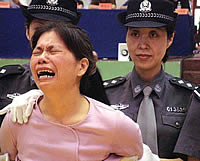The increasingly obvious failure of the drug war is spawning some odd discussions this year. There's Joe Biden and Dan Burton
calling for biological warfare in South America. There's a
crazy former DEA agent promising a one-year turnaround if we bust all the "druggies" and force them to stop partying. Lou Dobbs is really
frustrated too, and someone should talk to him before he starts racially profiling people and asking for consent to search.
But the prize might go to Barre, VT Mayor Thomas Lauzon who wants to try some of everything. From
The Times Argus:
BARRE â Mayor Thomas Lauzon on Saturday said he hoped the Legislature would consider imposing the death penalty on convicted crack and heroin dealers, and to legalize marijuana.
Failing that, the mayor said, he would call for a public forum in Barre to kick off a statewide discussion about the growing drug problem in Vermont and steps â including the death penalty and legalization â to control the situation.
Sounds like an episode of South Park. If the citizens of Vermont indulge him, this could be a highly entertaining public forum. For my money, Vermont is much more likely to legalize marijuana than execute anyone (they havenât imposed the death penalty in 50 years).
Expect to hear plenty more crazy talk of executing drug dealers and such this year. And don't be surprised to see more politicians calling for marijuana policy reform. The failure of the drug war is all around us and people are talking about it, for better or worse.
The drug war isnât going to start working one day. Inevitably, the road to reform will be paved with crazy idiots. If they want to legalize marijuana and execute crack dealers, we'll help with the former and talk them out of killing people later.
